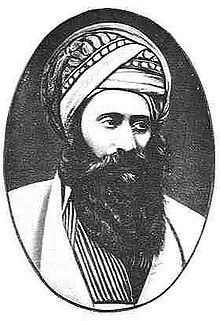Yosef Hayyim
This article includes a list of general references, but it lacks sufficient corresponding inline citations. (April 2009) |
Yosef Hayyim | |
|---|---|
 | |
| Native name | יוסף חיים מבגדאד |
| Born | 1 November 1834 |
| Died | 30 August 1909 (aged 73) |
Yosef Hayim (1 September 1835 – 30 August 1909) (
Biography
Hayim initially studied in his father's library, and, at the age of 10, he left the beth midrash and began to study with his uncle, David Hai Ben Meir, who later founded the Shoshanim LeDavid yeshiva in Jerusalem. In 1851, he married Rachel, the niece of Abdallah Somekh, his prime mentor, with whom he had a daughter and two sons.
When Hayim was only twenty-five years old, his father died.
Hayim clashed with the reformist Bavarian Jewish scholar Jacob Obermeyer, who lived in Baghdad from 1869 to 1880, and Hayyim excommunicated him.[2] Part of the contention was due to Obermeyer and Hayim's conflicting views on promotion of the Zohar.[3]
Works
The Ben Ish Hai (בן איש חי) is a standard reference in some Sephardi homes (functioning as "a Sephardi
Hakham Yosef Hayim authored over thirty other works, and there are many published
- Me-Kabtziel (Miqqabṣiʾel): an esoteric exposition of Jewish law providing a more detailed explanation of the reasoning underlying certain decisions. It has been speculated that Yosef Hayim's insistence on having all his works printed in the Jerusalem Sanjak prevented this essential work from being published.
- Ben Yehoyada (Ben Yəhoyadaʻ) and Benayahou: his commentary on the Aggada(narrative sections of the Talmud).
- The .
- Sefer Ben Ish Ḥai (Halakhot) (in Hebrew). Jerusalem: Merkaz ha-sefer. 1986. OCLC 492903129. (reprinted in 1994)
The names Ben Ish Hai, Me-Kabtziel, Rav Pe'alim and Ben Yehoyada derive from 2 Samuel 23:20. He chose these names because he claimed to have been a reincarnation of Benayahu ben Yehoyada, described as Ben Ish Hayil "son of a valiant man"; the man in whose merit, it is said, both the first and second Temple in Jerusalem stood.
Yosef Hayim was also noted for his stories and parables.[citation needed] Some are scattered through his halakhic works, but have since been collected and published separately; others were published as separate works in his lifetime, as an alternative to the European-inspired secular literature that was becoming popular at the time. His Qânûn-un-Nisâ (قانون النساء) is a book filled with parables concerning self-improvement. The book, directed towards, but not limited to women, is rare since it was composed in Baghdad Jewish Arabic.[7] It was last published in Israel in the 1940s.
See also
- Jonatan Meir, "Toward the Popularization of Kabbalah: R. Yosef Hayyim of Baghdad and the Kabbalists of Jerusalem", Modern Judaism 33(2) (May 2013), pp. 147–172
- Sephardi work of Halakha by Rabbi Yaakov Chaim Sofer.
- Yalkut Yosef, a contemporary Sephardi work of Halakha, based on the rulings of Rabbi Ovadia Yosef.
- Yehuda Fatiyah — a student of Yosef Chaim.
- Ben Ish Hai," [1] Archived 2013-04-05 at the Wayback Machine - The Life & Times of Hacham Yosef Haim by Yehuda Azoulay
References
- ^ https://www.jewishvirtuallibrary.org/chacham-yosef-chaim-ben-ish-chai
- ] (exclusion from communal participation) and the proclamation was read aloud in every synagogue in Baghdad.
- JSTOR 3317261. p. 115:
Jacob Obermeyer, a German Jew who lived in Baghdad from 1869 to 1880, found that many people read the Zohar although they did not understand its meaning. Elderly people told him that the custom was fairly new and not much in vogue in their youth.
- ^ https://www.jewishvirtuallibrary.org/chacham-yosef-chaim-ben-ish-chai
- ^ "HebrewBooks.org Sefer Detail: רב פעלים - חלק א-ב -- יוסף חיים בן אליהו, מבגדאד, 1834-1909". hebrewbooks.org. Retrieved 2019-05-10.
- ^ "HebrewBooks.org Sefer Detail: רב פעלים - חלק ג-ד -- יוסף חיים בן אליהו, מבגדאד, 1834-1909". hebrewbooks.org. Retrieved 2019-05-10.
- ^ "The Jewish Community of Iraq- History, Influence, and Memories". Chaldean News. 28 May 2021.
- The “Ben Ish Chai” Chacham Yosef Chaim (1834 – 1909), ou.org
- Great Jewish Leaders, Eliezer C. Abrahamson
- The Ben Ish Chai, tzemachdovid.org
- Rabbenu Hakham Ribbi Yoseph Hayyim Archived 2005-11-22 at the Wayback Machine, benishhai.org
- Rabbi Yosef Chaim of Baghdad, torah.net
- Benaihu Ben Yehoyada, ascent.org.il
Resources
- Ben Ish Chai text (missing the Introduction) (Hebrew), shechem.org
- Ben Ish Chai, fulltext, He:Wikisource
- Ben Ish Chai portrait by Tiefenbrun
- Ben Ish Chai audio lectures (MP3)
- Les Fleurs de l'Orient: The Genealogy Site, farhi.org
- The Halachot of the Ben Ish Hai, transl. S. Hiley, Philipp Feldheim. ISBN 1-58330-160-7
- Golden Apples: Parables Of The Ben Ish Chai , Y. Kahn, Artscroll. ISBN 0-89906-404-3
External links
- Jonatan Meir "Toward the Popularization of Kabbalah: R. Yosef Hayyim of Baghdad and the Kabbalists of Jerusalem", Modern Judaism 33(2) (May 2013), pp. 147–172
